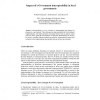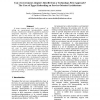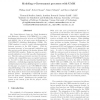10 search results - page 1 / 2 » Impact of e-Government Interoperability in Local Governments |
EGOV
2004
Springer
13 years 10 months ago
2004
Springer
Interoperability is a key concept for understanding the changes in progress in e-government. These changes are made gradually and with a phased implementation. The paper proposes c...
JTAER
2008
13 years 4 months ago
2008
e-Government can be defined as Internet applications for public administration processes and decision making on local, regional, national as well as cross-national level. Therefor...
HICSS
2010
IEEE
13 years 11 months ago
2010
IEEE
It seems common sense that “policy matters” in setting up e-government interoperability, mainly because collaboration should be guided by dedicated integration objectives and ...
EGOV
2003
Springer
13 years 10 months ago
2003
Springer
Abstract. If co-operating government agencies reside in different countries, they will differ in many respects: administrative ontologies and laws, political context, administrativ...
INFORMATICASI
2007
13 years 4 months ago
2007
The United Nation’s Center for Trade Facilitation and Electronic Business (UN/CEFACT)) is a standardization body known for its work on UN/EDIFACT and ebXML. One of its most rece...



